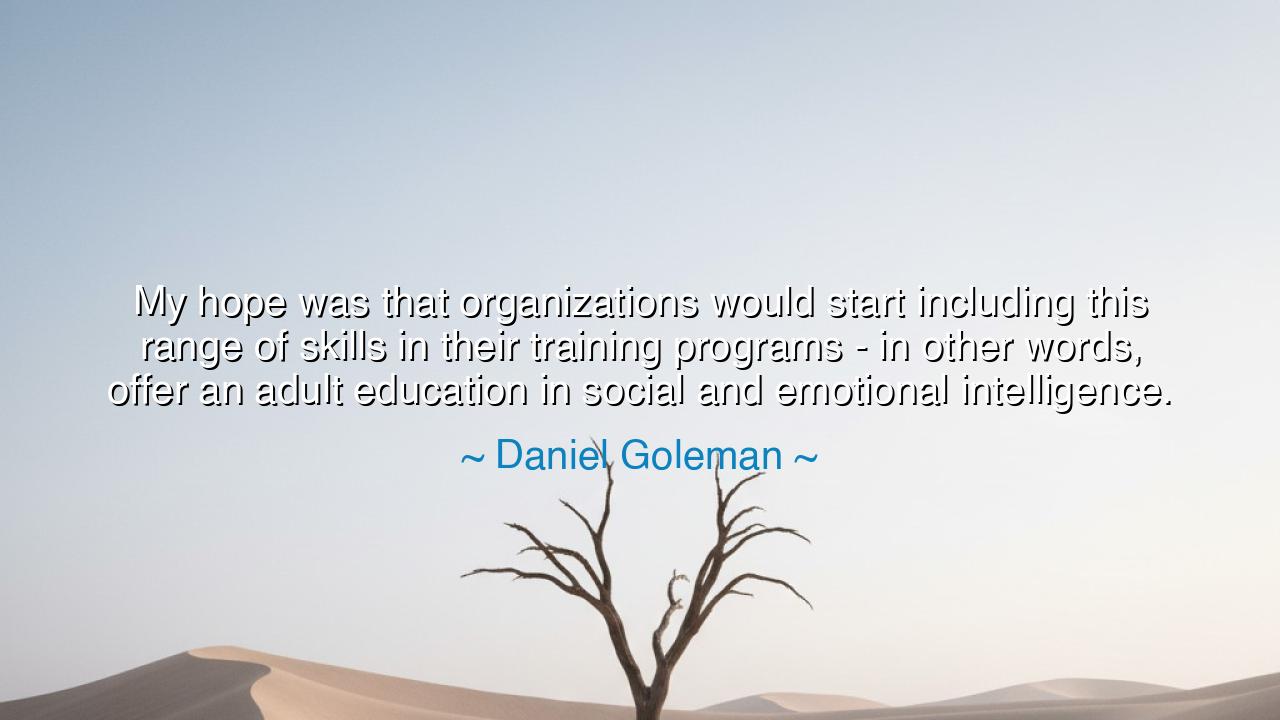
My hope was that organizations would start including this range
My hope was that organizations would start including this range of skills in their training programs - in other words, offer an adult education in social and emotional intelligence.






When Daniel Goleman spoke the words, “My hope was that organizations would start including this range of skills in their training programs — in other words, offer an adult education in social and emotional intelligence,” he was not merely advocating a new method of professional development. He was calling for a revolution of the human spirit within the modern world — a return to wisdom, compassion, and understanding amidst the noise of ambition and technology. In this statement lies a truth that transcends business and management; it touches the very essence of what it means to be human: that intelligence is not complete without empathy, and that the heart must be educated as carefully as the mind.
Goleman, a psychologist and author, gave birth to this vision through his groundbreaking work on Emotional Intelligence (EI), first introduced in his 1995 book of the same name. Drawing from psychology, neuroscience, and philosophy, he showed that the highest forms of success — whether in leadership, relationships, or society — are not born of pure intellect, but of self-awareness, emotional mastery, motivation, empathy, and social skill. When he spoke of “adult education in social and emotional intelligence,” he meant that learning must not end with technical knowledge or data. A civilization that trains minds but neglects hearts breeds efficiency without humanity, progress without peace.
The ancients understood this wisdom long before science named it. In the schools of Aristotle, the education of the young was not limited to logic and rhetoric, but extended to ethos — the cultivation of character. For Aristotle knew that reason alone could not guide a man toward virtue; he must also learn how to govern his passions, to feel rightly as well as think rightly. Goleman’s insight, though modern in expression, is ancient in soul — for he too reminds us that true intelligence unites thought with feeling, action with compassion, and knowledge with conscience.
Consider the story of Emperor Marcus Aurelius, the philosopher-king of Rome. Surrounded by power, burdened with responsibility, he governed not with tyranny but with emotional wisdom. His journal, later known as Meditations, is filled with reflections on patience, humility, and understanding the hearts of others. He wrote, “If it is not right, do not do it; if it is not true, do not say it.” Here was a ruler who practiced what Goleman calls social intelligence — the art of sensing the emotions and needs of others, and responding with integrity. Such leadership, born from self-knowledge and empathy, remains the gold standard for all who guide others, whether emperors or teachers, parents or managers.
Goleman’s hope, then, was not only for organizations, but for humanity itself. He saw that in the modern age, society trains the mind to achieve, but rarely trains the heart to connect. Corporations measure productivity, yet forget the power of understanding; schools test memory, yet neglect emotional maturity. By calling for education in emotional and social intelligence, Goleman sought to heal this fracture — to awaken the idea that the workplace, too, can be a place of growth, empathy, and wisdom. For an organization of intelligent minds without compassionate hearts is like a body without breath — active, but lifeless.
The lesson is clear and timeless: wisdom requires wholeness. To cultivate emotional intelligence is to learn the art of being human — to listen deeply, to understand oneself, to respond rather than react, to honor others even in disagreement. Each person, whether a leader or learner, must take up this practice as a daily discipline: to pause before anger, to seek understanding before judgment, to offer kindness even when it costs something. These are not soft virtues; they are the foundations of strength, unity, and peace.
Thus, let Goleman’s words be carried forward as both counsel and command: Educate not only the mind, but the soul. Train not only for skill, but for wisdom. For knowledge without empathy builds walls, but knowledge with compassion builds civilizations. And when you master your emotions, when you learn to see the world through the eyes of another, you do not merely succeed — you transform yourself into the kind of person through whom humanity itself grows wiser, kinder, and more whole.






AAdministratorAdministrator
Welcome, honored guests. Please leave a comment, we will respond soon